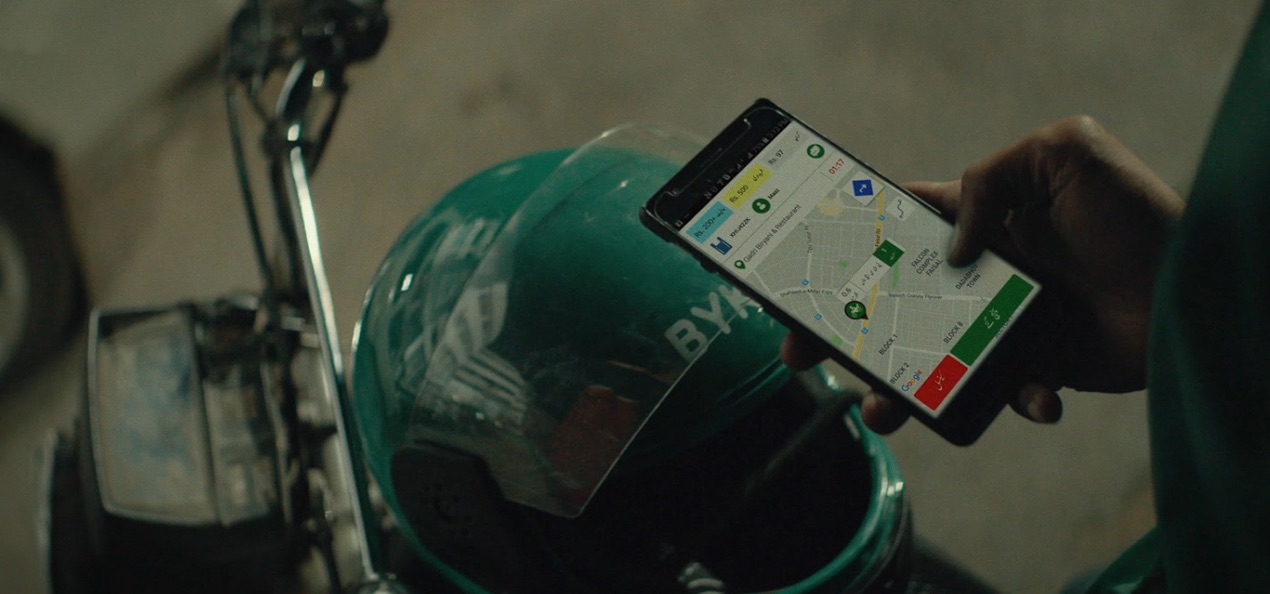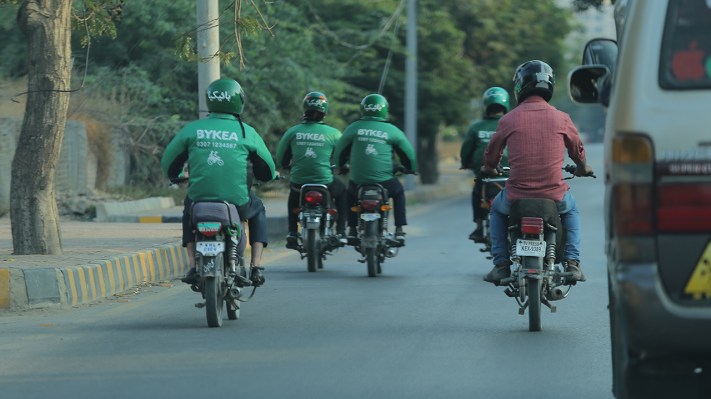Increasingly, the streets of Karachi and Lahore are being flooded with men riding bikes and wearing green T-shirts, a writer friend recently told me. In a sense, these men represent the emergence of Pakistan’s tech startups.
India now has more than 25,000 startups and raised a record $14.5 billion last year, according to government figures. But not all Asian countries are as large as India or have such a thriving startup ecosystem. Long overdue, things are beginning to change in bordering Pakistan.
Bykea, a three-year-old ride-hailing and delivery service, today has more than 500,000 bikes registered on its platform. It operates in some of Pakistan’s most populated cities, such as Karachi, Lahore and Islamabad, Muneeb Maayr, Bykea founder and CEO, told TechCrunch.
Maayr is one of the most recognized startup founders in Pakistan, and previously worked for Rocket Internet, helping the giant run fashion e-commerce platform Daraz in the country. While leading Daraz, he expanded the platform to cater to categories beyond fashion; Daraz was later sold to Alibaba.
The story of Bykea’s growth, like Bongo in Bangladesh, illustrates how a startup using local expertise can fend off heavily-backed rivals. It also underscores just how Pakistan’s nascent startup ecosystem shares a range of challenges with many of its Asian neighbors.
Maayr said his time working at Daraz gave him crucial insight into Pakistan’s logistics and transportation markets and how people in the nation tend to pay. He also traveled to India and Indonesia to understand how startups in those nations addressed similar challenges and how they were expanding.
Like India, cash dominates all transactions in Pakistan, home to about 35 million internet users. But unlike people in the neighboring country, relatively small numbers of consumers are comfortable with payments technology and there’s no nationwide push to educate them about it.
These are the three underlying pain points that Bykea is addressing today through its ride-hailing service. “Let’s pick Karachi, for example,” said Maayr. “It’s the biggest urban city we have in Pakistan, but it lacks public transportation.”
Bykea is addressing this by flooding the market with bikes. Today, the startup claims to offer the cheapest transportation option for people in several cities. “An average ride on Bykea in Karachi today covers nine to 10 kilometres and takes about 35 to 40 minutes. It costs users $1 — which is much cheaper than three-wheelers that would have cost them at least $2.50.”
How Bykea has achieved this is equally interesting. It does not own the bikes; riders use their own vehicles on the platform, charging only for their time and labor.
Winning on pricing was crucial for Bykea, as in recent years a handful of competitors, such as heavily-backed Uber and Careem, have launched in Pakistan. Bykea now leads over every competitor in Karachi, Pakistan’s largest city and business hub.
Instead of convincing people to leave their day jobs, Bykea, which has raised a little less than $7 million to date, has strictly focused on working with those who are looking to make money on the side. It also works with mom-and-pop stores to get the word out about its platform and only pays them for successful leads.
“If you look at the burn that is happening in the ride-hailing market across the globe, much of it is going into incentivizing drivers to join and continue with a platform. We, on the other hand, have tapped into the part-timer pool,” he said.
Understanding local conditions

But that isn’t the only reason Bykea has maintained its lead in the market. “Most drivers here can’t type and search in English,” said Maayr, but Uber and Careem offered support for only English for a long time, he said.
Bykea, which has offered its app in the Urdu language for years, also shows the name of the familiar zone where the driver needs to go, instead of showing GPS coordinates and creating confusion. “Our goal has been simple: dumbing down the product as much as we could. Uber may have attracted the top of the pyramid population, but there is a big disconnect between them and the low and middle-class people,” he said.
The other assumption that rivals made in Pakistan was that they thought that their rider partners would spend nine hours at a time on the road. “If you take into consideration the quality of road infrastructure and the state of bikes people are riding, you would know that they can’t spend more than five hours working,” Maayr said.
“We also launched voice-over-internet calls before our rivals because it was clear that people don’t want to spend money on making calls — a problem that is very common across Asia.”
As the startup grew, so has its ambitions. Bykea today works with a number of firms to deliver goods, parcels and food items — hence replicating both food-delivery startups such as Zomato and Swiggy in India and other delivery platforms such as Delivery.
It also offers a service that moves customers’ personal belongings from one part of the city to another, similar to what Google-backed Dunzo and Naspers-backed Swiggy offers in India.
Earlier this year, Bykea entered the payments market by launching Bykea Cash. As part of this service, the startup sends its rider to a customer’s doorstep and physically collects paper bills from them to facilitate utility bill payments and money transfers and to top-up mobile credits.
This month, it partnered with Jazz, one of Pakistan’s largest telecom operators. The startup is now working with Ant Financial and local banks for a mobile wallet that electronically fetches and transfers money to an account.
While this may sound like a primitive way to transact online, most people in Pakistan still go to a neighborhood store to transfer money to friends and top-up their smartphone. “We want to make it easier for them in many ways to perform these daily chores,” Maayr said. “At the end of the day, someone has to do something, even act as an intermediary, to improve the ecosystem. That’s the role we are serving today.”
Bykea will spend the rest of this year deepening its relationship with other companies and strengthening its position in each of the categories in which it operates today.
